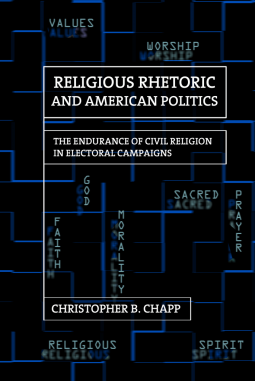
Religious Rhetoric and American Politics
The Endurance of Civil Religion in Electoral Campaigns
by Christopher B. Chapp
This title was previously available on NetGalley and is now archived.
Send NetGalley books directly to your Kindle or Kindle app
1
To read on a Kindle or Kindle app, please add kindle@netgalley.com as an approved email address to receive files in your Amazon account. Click here for step-by-step instructions.
2
Also find your Kindle email address within your Amazon account, and enter it here.
Pub Date Nov 13 2012 | Archive Date Nov 07 2012
Description
From Reagan's regular invocation of America as "a city on a hill" to Obama's use of spiritual language in describing social policy, religious rhetoric is a regular part of how candidates communicate with voters. Although the Constitution explicitly forbids a religious test as a qualification to public office, many citizens base their decisions about candidates on their expressed religious beliefs and values. In Religious Rhetoric and American Politics, Christopher B. Chapp shows that Americans often make political choices because they identify with a "civil religion," not because they think of themselves as cultural warriors. Chapp examines the role of religious political rhetoric in American elections by analyzing both how political elites use religious language and how voters respond to different expressions of religion in the public sphere.
Chapp analyzes the content and context of political speeches and draws on survey data, historical evidence, and controlled experiments to evaluate how citizens respond to religious stumping. Effective religious rhetoric, he finds, is characterized by two factors—emotive cues and invocations of collective identity—and these factors regularly shape the outcomes of American presidential elections and the dynamics of political representation. While we tend to think that certain issues (e.g., abortion) are invoked to appeal to specific religious constituencies who vote solely on such issues, Chapp shows that religious rhetoric is often more encompassing and less issue-specific. He concludes that voter identification with an American civic religion remains a driving force in American elections, despite its potentially divisive undercurrents.
Advance Praise
“Christopher B. Chapp's impressive book is a valuable addition to the literature. Religious Rhetoric and American Politics provides the reader with a detailed understanding of just how central identity and emotion are to politicians' religious rhetoric. Just as important, it shows how these rhetorical features influence public perceptions.”—Kevin Coe, University of Arizona, coauthor of The God Strategy: How Religion Became a Political Weapon in America
“Religious Rhetoric and American Politics is a nice reexamination of a long-standing conundrum—how to incorporate religious sentiment into the body politic without tearing it limb from limb. Christopher B. Chapp shows us how multidimensional such rhetoric can be and how it keeps introducing itself in old and new ways. Intriguingly, Chapp tells us that 'being religious' and 'being moral' are quite different matters and that they carry different political weight as well. This book is a thoughtful addition to a continuing, uniquely American, conversation.”—Roderick P. Hart, Shivers Chair in Communication and Government, University of Texas at Austin, author of Political Tone: What Leaders Say and Why
Available Editions
| EDITION | Other Format |
| ISBN | 9780801451263 |
| PRICE | $41.95 (USD) |



